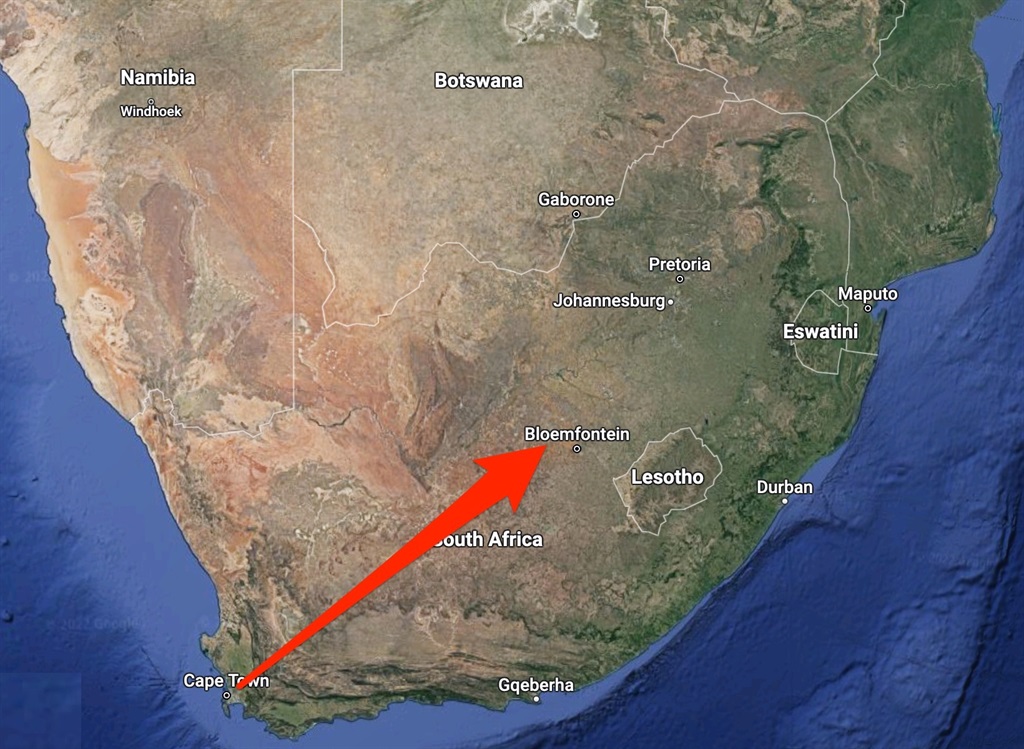
News analysis
- EFF leader Julius Malema says he will soon put a draft law before Parliament to move Parliament to Tshwane.
- In Cape Town, "Parliament is located in the farthest province from the majority of provinces, making it inaccessible to the majority of South Africans", Malema argues.
- In 2016, President Jacob Zuma said South Africa's two-capital system should be urgently dismantled.
- The geographic centre point of South Africa is in the rural Free State, making the town of Petrusburg perhaps the fairest seat for the legislature.
- But consider where SA's cities are located, and a patch of farmland south of Maseru, in Lesotho, would be the better.
Isolated in faraway Cape Town, Parliament is too isolated from the people of South Africa, EFF leader Julius Malema is due to argue in that same legislature, so it should be moved to Tshwane.
Malema on Friday published an explanatory memorandum for a private member's Bill, the formal starting point for the process by which any MP can bring any legislation before Parliament for consideration.
Malema said his draft law would be called the "Relocation of Parliament Bill", with just one purpose: "the relocation of the seat of Parliament to Tshwane, Gauteng".
Arguments and proposals for merging the administrative capital of Pretoria with the legislative capital of Cape Town have swirled since well before the democratic era – and have often been framed as a cost-saving measure. That is how then President Jacob Zuma described it in his 2016 State of the Nation Address, when he asked Parliament to consider uprooting itself "soon": as one of a series of cost-cutting measures then being urged on other spheres of government too.
Later, though, Zuma shifted to an argument about geography and access, saying Tshwane is more central, which would make it easier for members of Parliament to consult with a broader segment of the population, "and not just help those who have the means only and can fly to Cape Town."
That sidestepped counter-arguments, including from within the ANC, that the up-front cost of moving Parliament from Cape Town to Pretoria would either outweigh cost-savings entirely, or that the lump sump required is simply not affordable during tough economic times.
Malema's approach appears to be similar, with the cost to government as MPs travel between the cities secondary to what he says is a problem of inclusion.
"Parliament is located in the farthest province from the majority of provinces, making it inaccessible to the majority of South Africans, including Members of Parliament who spend a significant amount of time travelling to and from Parliament," says Malema in his explanation of his proposed legislation. "As a result, participation in parliamentary programs is limited to individuals and institutions with financial resources, excluding those unable to travel to Cape Town."
Government and state officials travel between Cape Town and Pretoria "in order to keep colonial agreements that separate administrative and legislative capital in two cities by racist colonisers who excluded the majority of black people and still does so today," he says.
For ease of travel for the majority of South Africans, Johannesburg would rank high as the most accessible place in South Africa, thanks to the hubs of OR Tambo airport and the Park Station railway and terminal, and the large population centres such as Soweto and Vereeniging to its south.
But exclude air travel, and a future high-speed rail link with Durban, and access becomes arduous, to various degrees, for more than 20 million people living along the coast from Richard's Bay to Cape Town.
For maximum pure geographic equality, the small town of Petrusburg in the Free State may have the best claim to Parliament. Petrusburg is the closest settlement with key infrastructure, such as a Post Office, to the exact centre of South Africa – as measured by drawing straight lines between the four farthest land border points.
Petrusburg has several incidental advantages. It is bisected by the N8, making for easy road access. It is less than an hour away from the Kimberley airport, and only a little over an hour from Bram Fischer International in Bloemfontein – a trip faster than that from OR Tambo to just about any viable site for Parliament around Pretoria.
That also puts it close to two provincial capitals (the Northern Cape for Kimberley and the Free State for Bloemfontein), and Petrusburg offers ample empty space to recreate the assembly chambers, administrative offices, housing, and other infrastructure Parliament requires.
However, while Petrusburg makes for a central point, it is not central for most South Africans. The middle of the country, as measured by population, is drawn east by the likes of Durban and Pietermaritzburg, and north by Gauteng and Polokwane, though that is largely offset by a pull to the south from Cape Town, East London, and the rest of the coastline excluding the thinly-populated West Coast.
Draw a line between the three biggest population centres (north Gauteng, Cape Town, and Durban), and you end up closer to Free State town on the other side of Bloemfontein, Excelsior. It is closer to both Durban and Johannesburg, as the crow flies, though not on a national highway, and from Durban the crow would fly over Lesotho, while the N3 that skirts the Drakensberg make for a longer trip.
Lesotho becomes a greater impediment the more cities you add to the mix. Calculate a centre point for not only the four big cities, but also Gqeberha, Pietermaritzburg, East London, and Bloemfontein, and the middle of South Africa swings towards the east, and a little bit south, until you end up in a patch of farmland not too far south of Maseru – on the Lesotho side of the border.
The government of Lesotho did not immediately respond to a request for comment on its willingness to grant South Africa a concessions to use that land, and its ability to defend the patch should SA decide to annex it.
